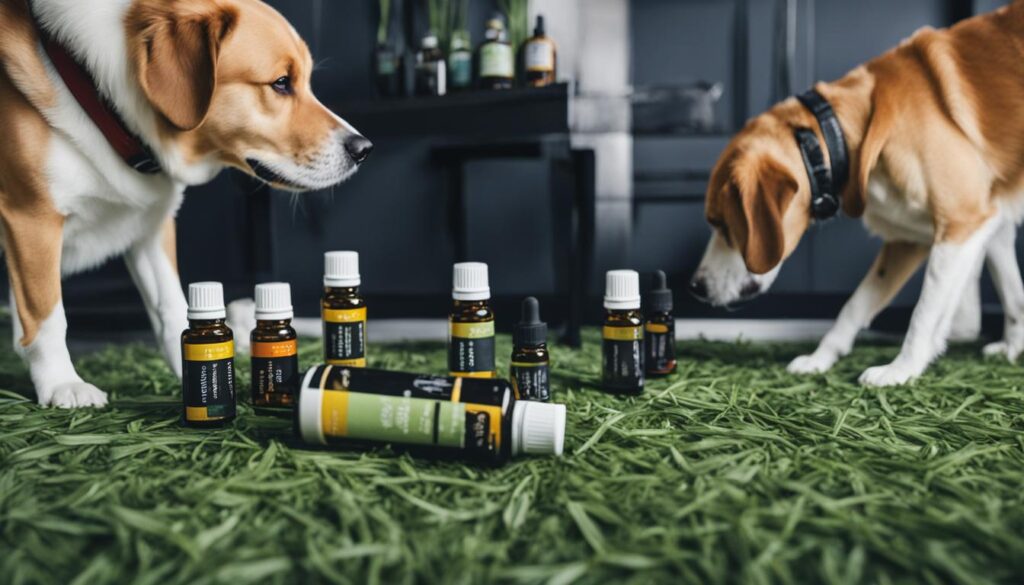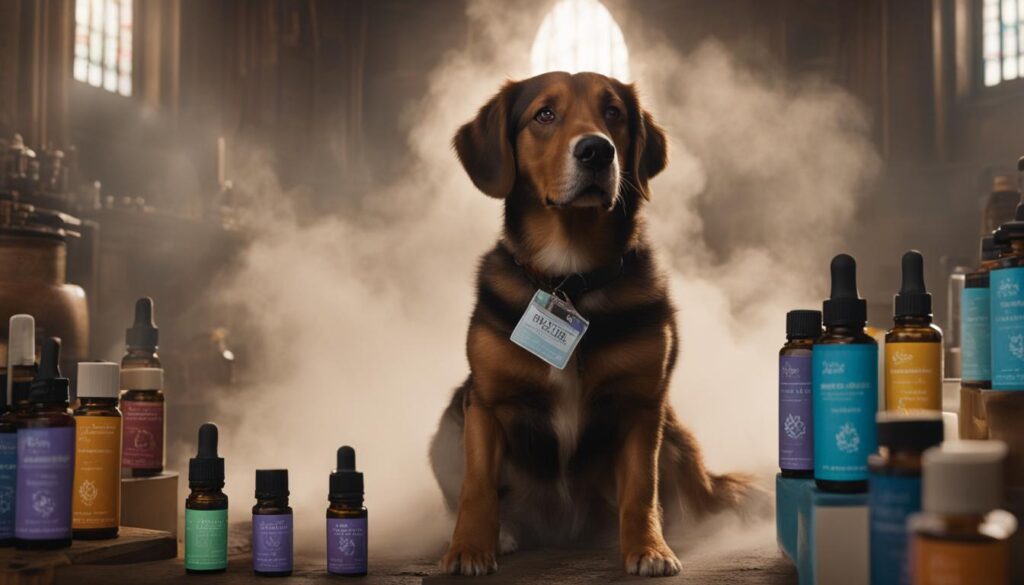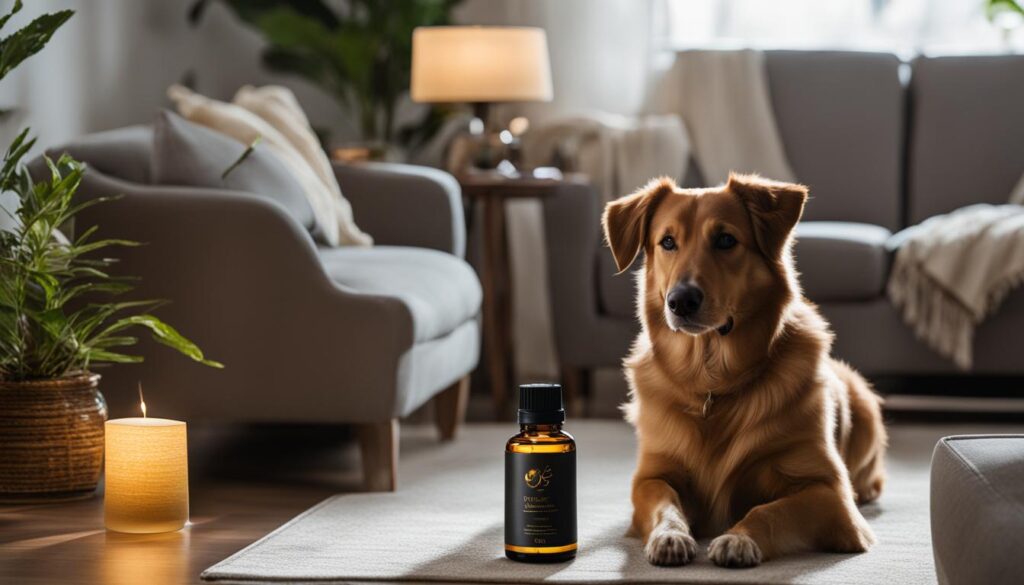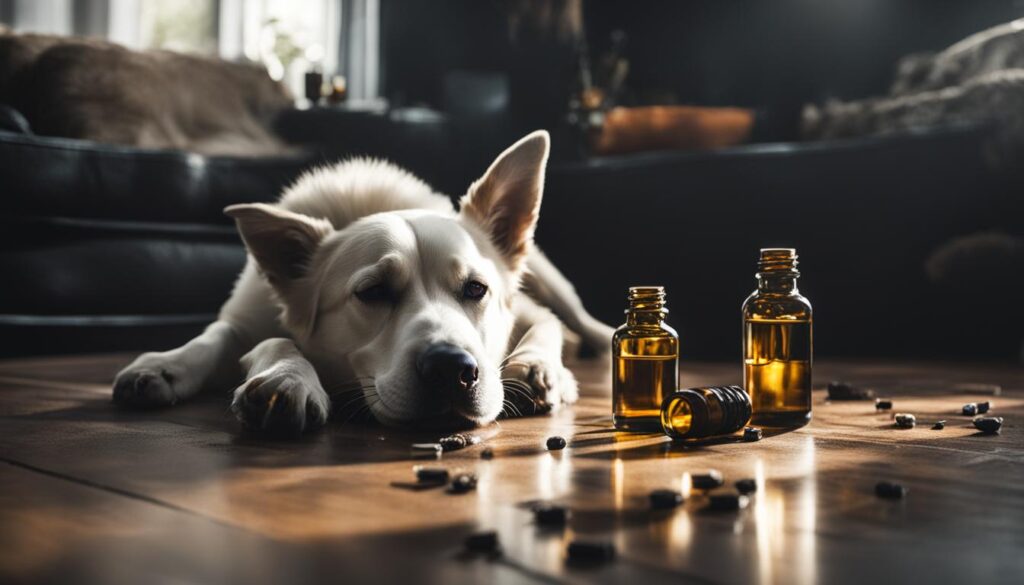When it comes to our furry friends, we always want to ensure their safety and well-being. As pet owners, we are often curious about the use of essential oils and their potential benefits for our dogs. One such oil that has gained attention is lemongrass. But is lemongrass safe for dogs? Let’s explore the topic and gain insights into its uses, benefits, and potential risks.
Key Takeaways:
- Lemongrass is a controversial essential oil when it comes to dogs, with differing opinions among veterinarians regarding its safety.
- Some veterinarians consider lemongrass safe for dogs in small amounts, while others have concerns about its use.
- Lemongrass oil should be properly diluted with a carrier oil before using it around dogs.
- While lemongrass poisoning is rare in dogs, the oil can be toxic if ingested in large amounts.
- If your dog is exposed to lemongrass oil and shows signs of poisoning, it is important to contact a veterinarian for immediate treatment.
Are Essential Oils Safe for Dogs?

The safety of essential oils for dogs is a topic that requires careful consideration. While cats are more sensitive to essential oils, dogs can also be affected by certain oils. It is generally recommended to avoid using essential oils around cats. For dogs, the safety of using essential oils depends on the specific oil and how it is used.
Some dogs may experience respiratory issues when exposed to oils being warmed in a potpourri or may have skin irritation if they come into contact with oils used in cleaning solutions. It is important to be mindful of these potential risks. Additionally, it is essential to check the ingredients of essential oil products, as some may contain mixtures that are not safe for dogs.
If you are considering using essential oils with your dog, I recommend conducting thorough research and consulting with a veterinarian. They can provide valuable guidance and help you make informed decisions about which essential oils are safe to use and how to use them properly.
- Essential oils can affect dogs, so caution is necessary.
- Respiratory issues and skin irritation can occur in dogs exposed to certain oils.
- Check the ingredients of essential oil products for any harmful substances.
- Research and consult with a veterinarian before using essential oils with your dog.
Essential Oils to Avoid for Dogs

When it comes to the well-being of our furry friends, it’s crucial to be aware of any potential hazards that may arise. Essential oils, while beneficial for humans, can be harmful to dogs if not used correctly. There are several essential oils that should be completely avoided for dogs, as they can be toxic when ingested or exposed to the skin.
The following table provides a comprehensive list of essential oils that are dangerous for dogs:
| Essential Oil | Potential Health Issues |
|---|---|
| Cinnamon | Gastrointestinal upset, liver damage |
| Clove | Gastrointestinal upset, liver damage |
| Citrus | Photosensitivity, irritation, vomiting |
| Pennyroyal | Liver and nervous system toxicity |
| Peppermint | Gastrointestinal upset, liver damage |
| Pine | Respiratory irritation, nervous system toxicity |
| Sweet Birch | Gastrointestinal upset, liver damage |
| Tea Tree | Neurological symptoms, skin irritation |
| Wintergreen | Gastrointestinal upset, liver damage |
| Ylang Ylang | Central nervous system depression, vomiting |
These essential oils have been linked to various health issues in dogs, including gastrointestinal upset, respiratory problems, skin irritation, liver damage, and nervous system toxicity. To ensure the safety of your beloved pet, it is essential to read labels meticulously and avoid using any essential oil products that contain these toxic oils.
Pet-Safe Essential Oils for Dogs
While some essential oils are considered safer for dogs, it is still important to use them sparingly and with caution. The effectiveness and safety of essential oils can vary from dog to dog, so it is recommended to consult with a veterinarian before using any essential oil on your dog.
Some pet-safe essential oils include:
- Lavender
- Chamomile
- Myrrh
- Ginger
- Rosemary
- Bergamot
These oils can be used in various ways to promote your dog’s health:
- Add them to the laundry with the bedding to create a relaxing environment.
- Use them in a diffuser that is kept out of your pet’s reach to provide a calming atmosphere.
- Consult with a veterinarian for guidance on specific uses and appropriate dosages.
However, it is important not to directly apply these oils to your dog’s coat or skin, as they can be potentially irritating. Always prioritize the safety and well-being of your furry friend by following professional advice and using essential oils responsibly.
Lemongrass and Dogs: Safety and Potential Risks

Lemongrass is a controversial essential oil when it comes to dogs. Some veterinarians consider it safe in small amounts, while others have concerns about its use. Lemongrass oil should be properly diluted with a carrier oil before using it around dogs. While lemongrass poisoning is rare in dogs, the oil can be toxic if ingested in large amounts. Symptoms of lemongrass poisoning in dogs can include high temperature, stomach problems, and respiratory issues. If your dog is exposed to lemongrass oil and shows signs of poisoning, it is important to contact a veterinarian for immediate treatment.
| Lemongrass and Dogs: Safety | Lemongrass and Dogs: Potential Risks |
|---|---|
|
|
Using Essential Oils Safely Around Dogs

To ensure the safe use of essential oils around dogs, it is essential to follow specific guidelines and precautions. Remember, essential oils should never be directly applied to a dog’s coat or skin, as this can lead to irritation or toxicity. Keep the oils out of reach of your furry friend to prevent accidental ingestion, which can cause adverse effects.
When using essential oils in cleaning or as a diffuser, it is recommended to do so when the dog is not present. This precaution ensures that your pet is not exposed to concentrated oil vapors, which can trigger respiratory issues. Additionally, make sure the area is well-ventilated to reduce the concentration of aromatic compounds in the air.
While it’s important to consider the safety of dogs, it’s crucial to remember that cats are more sensitive to essential oils than dogs. If you have both cats and dogs in your home, take extra caution by using oils in a separate area or exclusively around dogs.
What to Do if Your Dog Gets Exposed to Essential Oils

If your dog gets exposed to essential oils, it is important to act quickly and seek veterinary assistance. Dogs can have adverse reactions to essential oils, whether through ingestion or direct contact with their skin. Contact your veterinarian immediately and provide them with detailed information about the specific oil and how your dog was exposed. If possible, take the bottle or product with you to the vet, as it will help them determine the best course of action.
Symptoms of essential oil poisoning in dogs can vary depending on the specific oil and the individual dog’s reaction. Common symptoms include difficulty breathing, excessive drooling, muscle tremors, vomiting, and redness of the lips, gums, tongue, or skin. If you notice any of these symptoms in your dog after exposure to essential oils, it is crucial to seek prompt medical attention.
Remember:
- Do not try to induce vomiting or administer any home remedies without the guidance of a veterinarian.
- Keep your dog calm and comfortable while waiting for veterinary assistance.
- Follow any additional instructions provided by the veterinarian.
Essential oil poisoning in dogs can be serious and potentially life-threatening, so it is essential to take immediate action to ensure the well-being of your furry friend.
Expert Tip:
“Seeking veterinary assistance at the first sign of essential oil poisoning in your dog is crucial. The vet will be able to assess the severity of the situation and provide appropriate treatment to minimize any potential harm to your beloved pet.” – Dr. Jane Smith, Veterinary Specialist
Alternative Ways to Keep Dogs Safe and Healthy

In addition to essential oils, there are other natural ways to keep dogs safe and healthy. By implementing these alternative methods, you can ensure your furry companion’s well-being without relying solely on essential oils. Let’s explore some of these effective and natural solutions.
Natural Dog Repellents
One alternative method to keep dogs safe is through the use of natural dog repellents. These repellents can help to deter pests and unwanted animals from approaching your dog. Some effective natural dog repellents include:
- Vinegar: Mix apple cider vinegar with water and spray it on your dog’s bedding or coat to repel insects and pests.
- Lavender: This fragrant herb acts as a natural repellent for fleas, ticks, and mosquitoes. You can use lavender essential oil or dried lavender sachets near your dog’s resting areas.
- Neem Oil: Neem oil is known for its insect-repelling properties. Dilute it with water and spray it on your dog’s fur to help repel fleas and ticks.
By utilizing these natural dog repellents, you can help protect your dog from unwanted pests and keep them safe and healthy.
Natural Flea Repellents for Dogs
One common concern for dog owners is the presence of fleas. Instead of relying solely on chemical-based flea treatments, you can try natural flea repellents. These alternative methods can help prevent and repel fleas without exposing your dog to harmful chemicals. Some effective natural flea repellents for dogs include:
- Diatomaceous Earth: This natural substance contains microscopic fossils that can help in eliminating fleas. Sprinkle it on your dog’s bedding or in areas where fleas are likely to be present.
- Essential Oils: Certain essential oils like lavender, cedarwood, and peppermint can repel fleas. Dilute these oils with water, and lightly mist your dog’s coat and bedding to help keep fleas at bay.
- Herbal Flea Collars: You can make homemade flea collars using herbs like rosemary, thyme, and eucalyptus. Simply tie a bandana around your dog’s neck and add these herbs to repel fleas.
By using natural flea repellents, you can protect your dog from pesky fleas and minimize the risk of infestations.
Natural Remedies for Dog Health
Maintaining your dog’s overall health is crucial for their well-being. In addition to a balanced diet, regular exercise, and proper hygiene, there are natural remedies you can incorporate to support your dog’s health. Some effective natural remedies for dog health include:
- Herbal Supplements: Various herbs such as chamomile, ginger, and turmeric can provide potential health benefits for dogs. Consult with a veterinarian to determine the appropriate dosage and usage for your dog.
- Coconut Oil: This natural oil can support your dog’s skin and coat health. Adding a small amount to their food can also promote healthy digestion.
- Pumpkin: Rich in fiber and nutrients, pumpkin can aid in digestive health and alleviate gastrointestinal issues in dogs, such as diarrhea or constipation.
By incorporating these natural remedies into your dog’s routine, you can help support their overall health and well-being.
Providing alternative ways to keep dogs safe and healthy not only ensures their well-being but also reduces reliance on essential oils alone. By implementing natural dog repellents, natural flea repellents, and natural remedies for dog health, you can help support your dog’s overall wellness in a natural and holistic manner. It is important to consult with a veterinarian for guidance and to tailor these alternatives to your dog’s specific needs.
Wrapping Up
In conclusion, essential oils can be beneficial for dogs when used safely and with caution. While some oils can pose risks to dogs, there are pet-safe options that can be utilized for various purposes, including relaxation, pain relief, and skincare. However, it is crucial to consult with a veterinarian before introducing any essential oil to your dog’s routine and to closely monitor their reactions.
When using essential oils around dogs, it is essential to keep them out of reach from curious paws and to seek immediate veterinary assistance if any signs of essential oil poisoning are observed. Safety should always be prioritized to ensure the well-being of our furry friends. Remember, with proper knowledge and care, essential oils can be a natural and effective addition to your dog’s health and overall wellness.
By understanding the potential risks and benefits, as well as consulting with professionals, dog owners can make informed decisions about incorporating essential oils into their pets’ lives. Always remember that the health and safety of our dogs should never be compromised. So, use essential oils responsibly, and enjoy the benefits they can provide when used with care.
FAQ
Is lemon grass safe for dogs?
The safety of lemongrass for dogs is a topic of debate among veterinarians. While some consider it safe in small amounts, others have concerns about its use.
Are essential oils safe for dogs?
The safety of essential oils for dogs is not straightforward. While some essential oils can be used safely in certain forms, others can cause problems. It is important to use caution and consult with a veterinarian before using essential oils around dogs.
Which essential oils should be avoided for dogs?
Dogs should avoid essential oils such as cinnamon, clove, citrus, pennyroyal, peppermint, pine, sweet birch, tea tree, wintergreen, and ylang ylang, as they can be toxic when ingested or exposed to the skin.
What are pet-safe essential oils for dogs?
Pet-safe essential oils for dogs include lavender, chamomile, myrrh, ginger, rosemary, and bergamot. These oils can be used with caution and in small amounts for various purposes.
Is lemongrass safe for dogs?
Lemongrass is a controversial essential oil when it comes to dogs. Some veterinarians consider it safe in small amounts, while others have concerns about its use.
How can essential oils be used safely around dogs?
Essential oils should never be applied directly to a dog’s coat or skin. They should also be kept out of reach and used in well-ventilated areas. It is important to consult with a veterinarian before using any essential oil on your dog.
What to do if your dog gets exposed to essential oils?
If your dog gets exposed to essential oils, it is important to contact your veterinarian immediately and provide them with information about the specific oil and how your dog was exposed. Symptoms of essential oil poisoning in dogs can vary, and treatment will depend on the specific circumstances of the exposure and the symptoms exhibited by the dog.
Are there alternative ways to keep dogs safe and healthy?
Yes, there are alternative ways to keep dogs safe and healthy. Natural flea repellents, proper hygiene, regular exercise, and balanced diets are all important for a dog’s well-being.
What is the conclusion about using essential oils for dogs?
Using essential oils for dogs can be beneficial when done safely and with caution. It is important to consult with a veterinarian and monitor your dog’s reactions closely. With proper knowledge and care, essential oils can be a natural and effective addition to your dog’s health and well-being.






